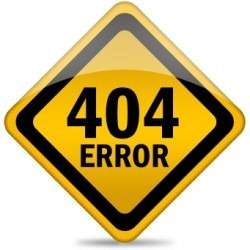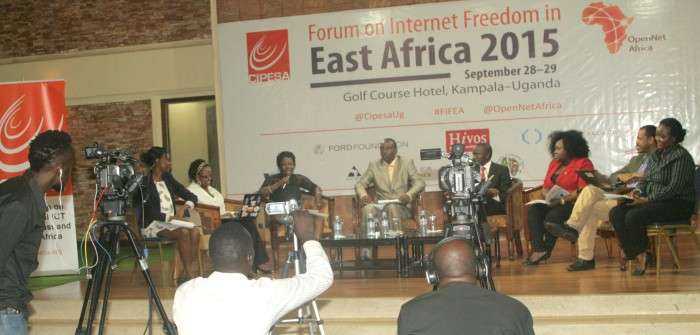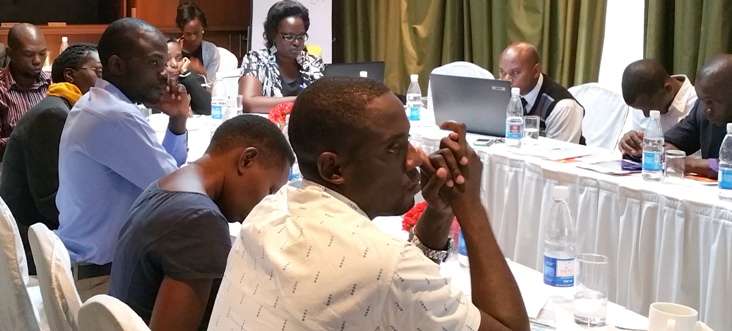| By CIPESA Writer
On the morning of the highly anticipated general elections in Uganda, citizens woke up to no access to social media platforms Facebook, Twitter and Whatsapp. The popular mobile phone-based financial transaction service commonly known as Mobile Money was also offline.
Tech-savvy Ugandans keen to keep information on the electioneering process flowing turned to sharing information on proxies and apps that enable circumventing the blockage through Virtual Private Networks (VPN).
Within hours, as more and more citizens got back online, there was a spike in social media activity. By 1pm local time, the hashtag #UgandaDecides recorded 35,000 tweets. Three hours later at 4pm, the number of tweets with this hashtag had jumped to 56,000. By 5pm, the hashtag boasted over 64,000 tweets. As at 7pm, the figure stood at over double that of 1pm and was still growing.
Incumbent President Yoweri Museveni, who has been in power since 1986, is standing in the current elections and faces perhaps the strongest electoral challenge ever to his three-decade rule. Ugandan citizens’ level of online civic engagement was sparked by the first ever televised presidential debates, the first of which was held in January and the second just last week. During both debates, #UgandaDecides alongside #UGDebate16 trended, raising some level of trust in the electioneering process.
But this trust seems to have been turned on its head today. Internet services in various areas of the country have been intermittent, leaving many unable to access information. Leading telecommunications service provider MTN issued a statement confirming that Uganda Communications Commission (UCC), the regulator, had “directed MTN to disable all social media and mobile money services due to a threat to public order and safety.” There has been no communication from any of the other service providers including Vodafone, which has championed disclosure of government requests for user information and surveillance support through its annual Transparency reports.
An official at the communications regulator confirmed to the local Daily Monitor newspaper that they directed ISPs to block access to social media sites over “national security” concerns related to the “sensitive” elections period.
As the day progressed, growing numbers of citizens were able to share updates on late arrivals of voting materials at various stations, reports of election malpractice, and provisional election results.
Previous election periods in Uganda have seen a crackdown on social media, voices critical of the ruling party, and independent media in the guise of promoting public order and unity as well as preventing the spread of false information. The 2011 elections were marked with filtering of short message services (SMS) which contained certain words.
Today’s blockage is for an indeterminate period.
See also State of Internet Freedom in Uganda reports 2014 and 2015.
New Year, Old Habits: Threats to Freedom of Expression Online in Kenya
By Juliet Nanfuka |
The beginning of 2016 has been marked with a series of arrests and summonses of individuals in Kenya as a result of content shared through social media platforms. Contrary to the constitutional right to freedom of expression, the incidents that relate to up to 10 individuals illustrate the Kenya Government’s continued use of vague legal provisions to stifle online content critical of the state or well-connected business people and high-ranking officials.
On January 22, news broke of an attack by Al-Shabaab militants on the Kenya Defence Forces at the El Adde camp in Somalia. The following day, journalist and blogger Yassin Juma was arrested over updates and pictures posted on social media relating to the attack. Juma was charged under Section 29 of the Kenya Information and Communications (KIC), 2013 for the improper use of a telecommunication system.
Section 29 of KIC on improper use of system states:
A person who by means of a licensed telecommunication system—
(a) sends a message or other matter that is grossly offensive or of an indecent, obscene or menacing character; or
(b) sends a message that he knows to be false for the purpose of causing annoyance, inconvenience or needless anxiety to another person, commits an offence and shall be liable on conviction to a fine not exceeding fifty thousand shillings, or to imprisonment for a term not exceeding three months, or to both.
On January 25, nine bloggers were summoned by the Directorate of Criminal Investigations (DCI) for questioning over alleged misuse of a licensed telecommunications system. According to DCI investigation officer John Kariuki, the nine bloggers were under investigations following undisclosed complaints made against them. “We have complaints and that is why we are investigating them. No one is targeting them wrongly,” said Kariuki.
In a statement condemning the arrests and intimidation of Kenyans online, the Bloggers Association of Kenya (BAKE) stated that the events were tantamount to “criminalization of civil matters” with users being arrested on charges that ultimately infringe upon freedom of expression. BAKE’s statement lists the arrest and detentions of the following:
- Anthony Njoroge Mburu (alias Waime Mburu) – arrested and charged for allegedly posting false information under Section 66(1) of the Penal code for content posted on Facebook accusing Kiambu Governor William Kabogo of importing substandard eggs. He is also alleged to have posted content intended to cause harm to Charlotte Wangui, who heads Sea Cross Farm in Kwale.
- Patrick Safari (alias Modern Corps), a prison warden – arrested for comments on the Al Shabaab attack. He spent a night in jail, and police retained his three phones and laptop after his release.
- Judith Akolo, a journalist with the Kenya Broadcasting Corporation (KBC) – summoned for questioning by the DCI for retweeting a post from Patrick Safari (@moderncorps) about a DCI advertisement of jobs within the department which was made public on deadline day (31st December 2015). Her phone was confiscated and her pin code requested. Eddy Reuben Illah – arrested for allegedly sharing images of Kenyan soldiers killed in an Al Shabaab attack on a WhatsApp group called “Youth People’s Union”. He was charged for the “misuse of a licenses telecommunication device”.
- Cyprian Nyakundi – arrested after tweeting about a construction company that was linked to Mombasa Governor Hassan Joho, in alleged violation of Section 29 of KIC Act on the “misuse of a licensed telecommunication device”.
- Elijah Kinyanjui – arrested for sharing a photo of a governor’s daughter on Whatsapp. He was also charged under Section 29 of KIC Act.
These arrests and summons add to a history of arrests made under laws marked by vague definitions and excessive powers granted to the state. The KIC (Amendment) Act, 2013 does not clearly define what constitutes content that causes “annoyance, inconvenience or needless anxiety to others,” while the Penal Code has no clear definition of a “rumour” or “report which is likely to cause fear and alarm to the public or to disturb the public peace.”
Further, the Security Laws (Amendment) Act, 2014 allows blanket admissibility in court of electronic messages and digital material regardless of whether it is not in its original form. Meanwhile, the Media Council Act, 2013 contains “broad” speech offences further reinforced by the Cybercrime and Computer related Crimes Bill, 2014.
Kenya’s technology sector is one of the fastest growing in Africa. The high internet penetration rate of 74% has bred a wave of citizen journalism which has flourished in the absence of the checks and balances present in traditional media and seeks to place social justice and accountability through ICT at the forefront of the country’s governance.
While these incidents in Kenya are the result of hate speech and rising terrorism fears, they are no doubt placing a chill on freedom of expression for citizens and the media and contributing to self-censorship for the fear of arrest.
African Civil Society Urged to Take Active Role in ICANN
By Marilyn Vernon |
Civil Society Organisations (CSOs) are a key player in the multi-stakeholder model of internet governance. However, civil society has been absent from discussions on the technical coordination of the internet domain name system (DNS) mechanisms.
Accordingly, on January 8, 2016, the Internet Corporation for Assigned Names and Numbers (ICANN) organised a workshop in Nairobi, Kenya to encourage more African civil society participation in the organisation’s work.
At the workshop which was attended by over 50 participants from private sector, academia, civil society, and the technical community, Adam Peake, ICANN’s Civil Society Engagement Manager, noted that at the core of ICANN’s functions was the bottom-up community based consensus which promotes inclusive engagement from the global community to keep the internet open, secure and inter-operable. This gives rise to many critical issues relating to human rights online, including privacy, access to information, freedom of expression, transparency and accountability, areas in which CSOs have extensive expertise.
Peake called for more meaningful CSO participation in ICANN processes and for their increased contribution to internet governance discussions and the development of solutions to align technical processes to government accountability and public interest.
Some of the critical issues for civil society engagement in ICANN came to the forefront during ICANN’s 50th meeting held in London in June 2014. At the meeting, the Council of Europe raised concerns about ICANN’s policies and procedures regarding global public interest and the protection of human rights. The Council cited states’ awareness of their responsibility to protect the human rights of their citizens including the right to freedom of expression; states’ attention to vulnerable groups; and the need to strike a balance between economic interests and other objectives of common interest, such as pluralism, cultural and linguistic diversity. As a result, recommendations were made for developing an ICANN human rights review process and reporting.
Since then, the Cross Community Working Party (CCWP) on ICANN’s Corporate and Social Responsibility to Respect Human Rights has been created. The party aims to address several concerns, including the inclusion of a reference to human rights in ICANN’s Bylaws; defining public interest objectives; and developing a mechanism to safeguard human rights.
While recognising that CSO participation in ICANN processes is critical, participants at the Nairobi workshop highlighted various challenges. For Africa in particular, there is limited knowledge of the operations of the domain name industry. There is also limited awareness of the role and responsibilities of governments in the ICANN policy development process that cuts across national policy areas such as internet security, development, and freedom expression.
Dr. Bitange Ndemo, the former Permanent Secretary in the Kenya ICT Ministry, said the exclusion of African CSOs from internet governance policy making process limits regional and international cooperation, decreases dialogue at the national and regional levels, and discourages strategic stakeholder partnerships. As a result, an environment in which stakeholders suffer from a lack of understanding and mistrust is created, which undermines citizen-centred socio-economic public policy development.
African civil Society engagement in public policy frameworks to support the evolution of the internet takes place in various platforms. These include the African Network Information Centre (AFRINIC), the Internet Governance Forum (IGF), and the Internet Society (ISOC). Other platforms that enable civil society contributions to Internet Governance include regional Internet Governance forums like the East African IGF which, Kenya, Burundi and Uganda have hosted in the past.
In order to transform the DNS and internet industry in Africa and provide regional support, ICANN launched the Africa Strategic Plan (2016-2020). Participation in ICANN is facilitated through advisory committees, supporting organisations and working groups such as the At-Large Advisory Committee (ALAC), which is structured by region and serves the African region through the African Regional At-Large Organisation (AFRALO), Non-Commercials Users Constituency (NCUC), Non Commercial Stakeholders Group (NCSG), and the Not for Profit Operational Concerns Constituency (NPOC).
Currently, there are 41 African civil society groups participating in the AFRALO, 80 members in the NCUC, two members in the NCSG executive committee, and additional African representation in the various supporting organisations and advisory committees of ICANN.
To learn more about ICANN engagement and its community-based policy making process, you can visit the ICANN resources page and the Beginner’s Guides to ICANN processes.
What Should be on the 2016 Agenda for Internet Freedom in Africa?
By Juliet Nanfuka |
Towards the end of 2015, the Collaboration on International ICT Policy for East and Southern Africa (CIPESA) under the OpenNet Africa initiative convened some of Africa’s leading thought leaders to discuss the various facets of internet freedom in Africa.
The Forum on Internet Freedom in East Africa is one of very few gatherings that assemble an African audience within the continent to discuss matters related to upholding internet freedom. The Forum brought together 200 participants from 18 countries – triple the number of those who attended the inaugural 2014 forum, which hosted 85 participants from six countries. The event drew up a set of actionable recommendations that will inform onward engagements on advancing internet freedom in Africa by CIPESA and its partners, and hopefully for other actors in this space.
Over the course of two days, several issues were discussed, including how to address online violence against women (VAW), whose magnitude and manifestation is not clearly known, as most cases in Africa go unreported.
Another key highlight was the increase in freedom of expression violations for critical media and bloggers especially during periods of electioneering. One way to address this could be through the use of counter speech and transparency in combating hate speech, misinformation and false claims. The media’s role in advancing internet freedom in Africa – both as a vulnerable group but also as infomediaries – was highlighted.
Africa has registered a rise in abuses and attacks on internet freedom, including a proliferation of laws, legal and extralegal affronts, as well as limited judicial oversight over surveillance and interception of communications. Discussions on the balance between national security and its perpetual clash with freedom of expression, access to information and the right to privacy reflected the need to address gaps in existing laws that do not adequately protect citizens from mass surveillance and privacy infringements.
Meanwhile, the appreciation of digital safety tools and practices remains paramount, for citizens, the media, human rights defenders and activists. Thus, the continued need for capacity building and awareness raising efforts on internet freedom was stressed by Forum participants. Closely related to this is the need for localisation exercises between tools developers and end users, given the diverse contexts of African internet users.
Internet freedom could also be supported by the budding community of artists and creatives on the continent, who are currently not adequately involved in discussions around freedom of expression and privacy online.
Read the full Forum Report, which also explores the relationship between internet freedom and online economics, press freedom, online creative expression, access to information, cybercrime and digital safety, from the perspectives of law enforcement, regulators, intermediaries, artists, the media and human rights defenders. On each of these themes, the report discusses the challenges and opportunities and suggests actions to take in order to advance internet freedom in Africa.
CIPESA Convenes Journalists to Discuss Uganda’s Data Protection Bill
By Esther Nakkazi |
Ugandan citizens’ personal data may be at risk of misuse if the Uganda Data protection and Privacy Bill (2014) to be tabled before parliament is passed in current form. Currently, large entities like telecommunications service providers, insurers, hospitals and even schools retain the information of millions of citizens who remain unaware of how secure their information is, especially as more of it becomes digitised.
While Uganda called for comments to the Bill in late 2014, little progress was made on it over the course of 2015. According to Gloria Katuuku from the Ministry of ICT, the comments received have been incorporated into a revision of the bill. “We brought this Bill before the public so that we get conclusive remarks. The bill has been gazetted and will be tabled in parliament, meaning at this time we shall just compile the concerns,” said Katuuku. She was speaking at a workshop convened by the Collaboration on International ICT Policy for East and Southern Africa (CIPESA) where Ugandan parliamentary journalists discussed data protection and privacy with reference to the bill.

The workshop was organised in conjunction
with the Uganda Parliamentary Press Association (UPPA) and aimed to create awareness among parliament journalists about clauses in the proposed law that contravene citizens’ rights, including to privacy. Few journalists were aware that government had drafted the law and called for robust media engagement with Members of Parliament so as to generate debate on data protection and privacy issues.
The former Chairman of parliament’s ICT Committee, Edward Baliddawa, said the data protection law should have been the basis for other cyber laws in Uganda. He added that as the country edges towards e-commerce, such as business process outsourcing, there is a need to regulate data controllers.
“This Bill is good for our safety and privacy as individuals and to become an e-commerce country,” he said. However,he also called for continuous engagement with all stakeholders across the lifespan of the bill – drafting, tabling to parliament and any eventual amendments.
Although existing laws such the Electronic Signatures Act, 2011, the Computer Misuse Act, 2011, the Regulation of Interception of Communications Act 2010 and the Communications Commission Act 2013 cover aspects of data protection and privacy, they contain contradictions and potentially expose users’ information to unwarranted access and misuse by authorities. Lillian Nalwoga, CIPESA’s Policy Officer, said of the laws: “These laws have broad terminologies that should be amended to repeal contradictory provisions and this can be done within the Data protection and Privacy Bill, 2014 in the contexts of data users and collectors, and to prevent abuse.”
See this Overview of How ICT Policies Infringe on Online Privacy and Data Protection in Uganda
But the proposed data protection and privacy law that is meant to address privacy of citizens’ communications and data still has ambiguous terminologies, unclear definitions and arbitration issues that will negate its purpose.
According to CIPESA officials, the drafting phrase should further engage with and seek consultations with different stakeholders including civil society, private sector, the media and academia for an extended period prior to tabling it before parliament. This would ensure that the law passed “is inclusive, accommodative and addresses the concerns raised by all the stockholders,” said Wakabi Wairagala, the head of CIPESA.
At the workshop, CIPESA officials referred journalists to various areas of concern in the draft bill including some of its ambiguous terminologies, such as Section 4 (2) which states that personal data may be collected or processed where necessary for ’national security’ or for the ‘proper performance’ of a public duty’ by a public body. However, these words can be misinterpreted and leave room for the access to and abuse of citizens’ information.
Meanwhile, Section 7 (2) says data can be collected from another person, source or public body in certain circumstances without the consent of the owner. The length of time that the collected personal data can be retained is also not indicated. Section 14 (1) states that the data cannot be held for a period longer than is necessary and says it will be retained for national security purposes.
Overall, the bill does not explicitly state what constitutes a ‘privacy infringement’, thereby leaving users’ data open to abuse by data collectors and processors. It also does not state the procedures for citizens to access their data.
See CIPESA’s review of the Bill: Reflections on the Draft Data Protection and Privacy Bill





